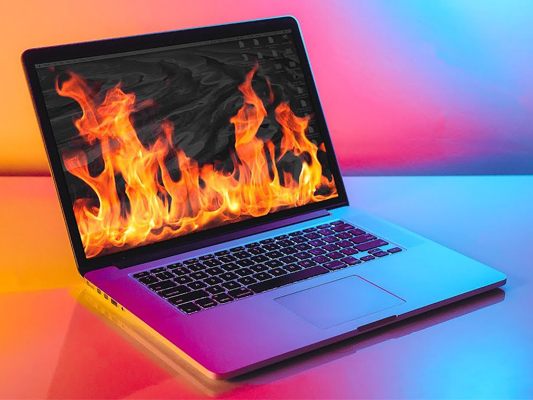HOW TO PREVENT YOUR LAPTOP FROM OVERHEATING

Laptops are used extensively in the modern era. The portability it offers is one of the main reasons why most opt for a laptop. However, it has downsides like any other electronic gadgets. One of the biggest being the heat it produces. We, human beings, show our frustration often by venting out anger emotions. When it comes to laptops, it vents out heat when it's frustrated (its components are disturbed). Though, not all the models get heated up especially the high-end ones.
If you have accessed this blog deliberately, then we guess that you are troubled with your laptop's overheating issues. It's really annoying, isn't it? The heat at times reach the keyboard area and make it hard for us to even type. Luckily, there are methods by which you can alleviate the heat or sometimes completely get rid of it. Before we hop into those methods, let's see why laptops overheat.
What Causes Laptop Overheating?
The culprits are multiple when it comes to overheating of a laptop. The reason can be anything given below:
- The inside of the laptop is cluttered with dust, especially on the fan, clogging the venting pathway.
- Usage of some applications that are heavy for the CPU to process.
- Hardware failures.
- Ageing of the laptop.
- Degeneration of thermal paste (a paste that comes pre-applied on the majority of CPU for the purpose of keeping the processor cool)
- Relentless usage
- Excessive charging
Now let's see the remedies!
Keep Your Laptop On Flat Surfaces
First and foremost, this is what you should do to prevent overheating of your laptop. Adequate airflow is imperative to keep your laptop cool and when you keep it on uneven surfaces like a bed, blanket or rug, the airflow gets blocked and it leads to overheating. Sometimes, your laptop becomes so hot that it automatically shuts down which could result in data loss. Overheating could even break out the fire. Therefore, the best bet is to keep your laptop on a flat surface like a table or any other similar surface.
Clean The Fan Occasionally
The purpose of the grill that's placed beneath a laptop is to vent out the air from the fan. It also acts as a pathway for the air outside to travel inside the laptop. Along with the air comes all the particles which then settle on the fan. The piling up of these particles disrupts the performance of the fan and hence, the system doesn't perform as it's supposed to do. As a result, it gets heated and sometimes it puts us to a situation where we can't keep the laptop on our lap, ironically. The solution to this is to clean the fan periodically so that it stops the accumulation of dust-like particles. For cleaning it's better to use a canned air (also known as 'gas duster') because servicing a laptop can get a tad difficult when compared to servicing a PC. However, if you are knowledgable enough, then you could pop up the bottom lid and clean the fan by yourself.
Limit Using Intense Applications
When it comes to handling the load, every processor has certain limits. So, when you run heavy processor-intensive software or application, your laptop may not be able to bear it and gets heated up as a result. These applications can be anything like high-end games, coding or graphic designing applications. Even browsing through a website that runs tons of scripts can also lead to overheating of laptops. Therefore, it's ideal to limit running such application or if it's necessary for you to use them, then consider upgrading your laptop.
Ensure Your Room Is Cool
When your room is hot, there is a high chance for your laptop also to get hot. That is one of the reasons why many workplaces are air-conditioned. Therefore, ensure your room is cool, otherwise, your laptop will start overheating and sometimes, even the components of it might fail. Either turn on the Air Conditioner if you have it or else ensure you keep your laptop where there is no direct sunlight and also make sure the windows of your room are open so that there will be more air circulation in the room.
Ensure There Is Enough Ventilation
Most of the time when we place the laptop, the grill gets covered and therefore, the airflow gets blocked. So, whenever you place the laptop wherever you wish, ensure there is enough ventilation. If you are placing it on your lap, make sure your thighs are not blocking the grill. If you are placing it on a table, keep it a bit elevated with the help of a something thick like a book. You could also opt for a laptop stand which would perfectly cater to your needs. Another option is to go for a cooling pad/stand which will provide extra cooling for your laptop. When buying a cooling pad check whether it suits your laptop. If you end up buying incompatible pad, it would be harmful to your laptop.
Test For Hardware Failures
A laptop is comprised of many components out of which some are rather complicated. Even a failure of a tiny component may result in overheating. Therefore, it's of utmost importance to check whether every hardware is working properly. You could check for hardware failure with the tools like 'Performance Monitor' and 'Windows Memory Diagnostic'. This can furnish you with details regarding your hardware and if you see any failures then replace them as soon as possible.
Overheating has the potential to completely fail a laptop. Therefore, keep in mind all these when using a laptop. If the heat becomes unbearable and none of the preventive measures is panning out well, then it's better to upgrade the hardware if possible or go for a new laptop.
